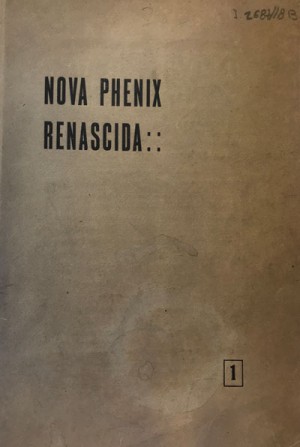
It is a sole issue, published in the summer of 1921, of little graphic interest and little artistic collaboration.
There is, however, an article by Ernesto Gonçalves about the Ballets Russes, a curious collaboration given that Manuel de Meneses, in a severe editorial, criticizes Manuel de Sousa Pinto, author of 'Os Bailados Russos' (1918, a fundamental book for the study of the reception of Ballets Russes in Portugal). Meneses says of this author that he has a "literary pedantry", but also attacks other Portuguese intellectuals and writers of the new generation, such as António Patrício (who is characterized, in his opinion, for showing 'metrified prose') or Augusto de Castro.
In this initial text, Manuel de Meneses begins by contradicting the Catholic journalist Álvaro Maia – who will have his own controversy with Fernando Pessoa the following year (with the article “Literatura de Sodoma”, published in Contemporânea n.º 4 , of October 1922, in response to Pessoa's article published in the same magazine, “António Botto: the aesthetic ideal in Portugal” (No. 3, of July 1922) - taking into account a supposed literary inquiry on contemporary literature ( of 1918-21), which resulted in a 'fiasco' [sic].
Then, putting aside Júlio Dantas and Malheiro Dias as true talents, he ends up attacking women writers: "Another serious symptom of our decadence is the invasion of women into the noble field of letters, with a torrent of easy and banal booklets that, squeezed, are no more than a document of our weak and flat mentality."
It is thus an article of reckoning with several important personalities of that period, a revenge for the spite with which his pamphlet A Novíssima Geração (1917) was treated, hence its title of "Portugal Literário". An anti-programmatic text for a magazine that purports to be without "the pedantry of a program", all in the name of "elegant, orderly and European freedom of mind", but which ends up being quite conservative in its referents. A non-progressive motto for a magazine that wants to be a 'new phenix reborn'.
Attesting this idea, the final pages on recent editions, by Meneses, continue on the path of controversy, emphasizing that the two only editions worth mentioning are re-editions of books by two renowned writers: Eugénio de Castro (we must not forget that this is a Coimbra magazine) and Alentejo's Fialho de Almeida.
The literary contributions include sonnets by Madeira’s Cabral do Nascimento, a short story by the magazine's director (Luís Vieira de Castro) as well as some "oriental poems" by Álvaro Manso de Sousa.
This magazine also confirms the canonical and tutelary importance of the figure of Camilo Castelo Branco at the beginning of the century (of which a publication like Camilliana, present here, is symptomatic), with an article on two unpublished letters by the northern writer, with a large callout on the index page. This intention of homage is later confirmed in the pages of a literary chronicle, where the writer's friendship with Francisco Vieira de Castro, certainly a relative of the magazine’s director, is mentioned...
Ricardo Marques
